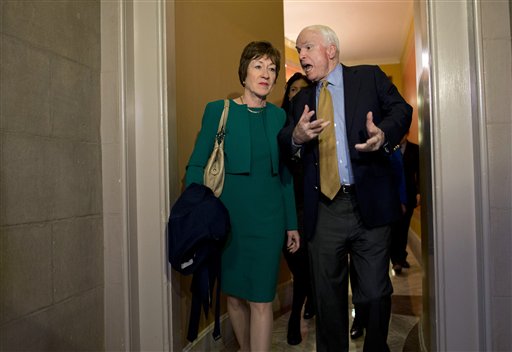WASHINGTON, DC — During the lead-up to a compromise by Senate leadership to end the partial government shutdown, more than a dozen senators came and went from Sen. Susan Collins’ office — the hub for the “Gang of 14” pressing for a compromise to end the stalemate, reopen government and avert a Treasury default.
Angus King, her fellow senator from Maine, describes her as the “gang leader.”
Collins acknowledges her leadership role in helping to resolve the stalemate but said the word “gang” has negative connotations. “I like to think of it as the ‘common-sense caucus,'” she said.
Key elements agreed upon by the 14 senators — seven Republicans, six Democrats and one independent — were part of the final bipartisan proposal that was put forward by Senate Majority Leader Harry Reid and Republican leader Mitch McConnell and approved by Congress on Wednesday, resolving the budget crisis for the time being.
“There is a group in the common sense caucus that’s willing to lead, take risks and come up with solutions that are bipartisan. I think that’s good for country,” Collins said.
The bipartisan message likely plays well among a Maine electorate that supported President Barack Obama in the last election. Collins, who is up for re-election next fall, is one of just two congressional Republicans left in New England.
The Gang of 14 started with a Gang of One, with Collins sitting in her office, which was largely deserted because of furloughs, and watching the Senate action on a video monitor.
Frustrated by the partisan attacks and lack of solutions, she began typing furiously on her keyboard. “I wrote up a quick speech and marched over to the Senate floor,” she said.
With King presiding over the Senate, she delivered a proposal for resolving the crisis, and her cellphone quickly began ringing, with Alaska’s Lisa Murkowski and New Hampshire’s Kelly Ayotte, both Republicans, expressing interest. Soon after, West Virginia’s Joe Manchin became the first Democrat to sign on.
“She was the facilitator,” Ayotte said of Collins. “I really appreciate her as a common sense bipartisan consensus builder, which is what we needed here.”
King, an independent, praised Collins for forging compromise despite the possibility that she could come under attack by tea party activists, as was former Sen. Olympia Snowe, another moderate Republican from Maine who retired because of what she called corrosive partisanship that left the Senate in gridlock.
“That’s called leadership,” King said.
In the end, four key provisions adopted by the Gang of 14 were included in the final compromise, Collins said.
Those were creation of a conference committee to report back in mid-December on fiscal plan; providing funding to keep the government open through mid-January; extending the debt limit a few weeks beyond that; and income verification to prevent fraud among people applying for subsidies under the Affordable Care Act health exchanges.
Raised in northern Maine, Collins might seem like an unassuming senator to take on the role of shepherding the various factions. But she’s also known for being determined.
“I don’t give up easily. And when I believe in something that something is right and right for the American people, I’m going to keep working until I have a solution. I think that’s what people want,” she said.
Collins, who hopes the coalition sticks together, said it’s too early to say whether this is the start of something new in terms of bipartisan cooperation.
“I think most people in this country are centrists and they want pragmatic solutions to problems. They want the application of common sense. But it’s too early to assess exactly what the impact will be on political parties. I’ll leave that to the pundits,” she said.
Send questions/comments to the editors.



Success. Please wait for the page to reload. If the page does not reload within 5 seconds, please refresh the page.
Enter your email and password to access comments.
Hi, to comment on stories you must . This profile is in addition to your subscription and website login.
Already have a commenting profile? .
Invalid username/password.
Please check your email to confirm and complete your registration.
Only subscribers are eligible to post comments. Please subscribe or login first for digital access. Here’s why.
Use the form below to reset your password. When you've submitted your account email, we will send an email with a reset code.